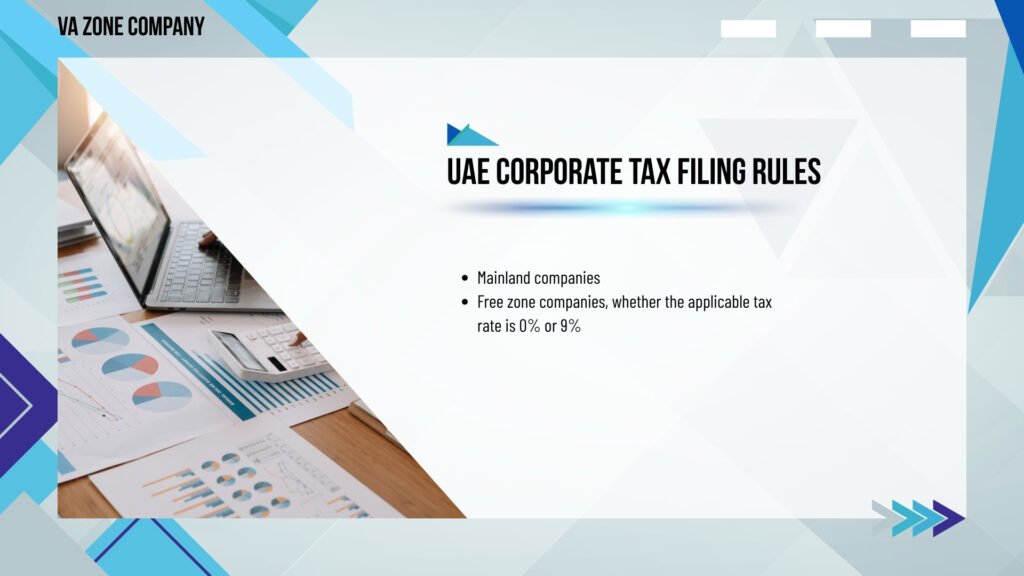UAE Corporate Tax Filing Deadline 2025 – Avoid Fines & Penalties

Table of Contents
Corporate Tax Filing Deadline 2025 UAE – Penalties and Compliance Guide
With the UAE’s corporate tax framework fully in effect, the corporate tax filing deadline for 2025 is more than a date — it is a legal obligation for all taxable entities. Missing this deadline can result in financial penalties, damage to your business reputation, and heightened scrutiny from the Federal Tax Authority (FTA). Understanding the filing requirements, penalties, and how to stay compliant is crucial for every business.
For detailed guidance on corporate tax filing, documentation, and professional support, visit Corporate Tax Return Filing in UAE — a trusted resource for companies navigating UAE corporate tax obligations.
UAE Corporate Tax Filing Rules

According to Federal Decree-Law No. 47 of 2022, all taxable companies must submit their corporate tax returns within nine months after the end of their financial year. This applies to:
- Mainland companies
- Free zone companies, whether the applicable tax rate is 0% or 9%
Failure to comply can trigger severe penalties, so businesses must plan.
Filing Deadline Examples for 2025
- Financial year ending 31 December 2024 → Deadline: 30 September 2025
- Financial year ending 31 March 2025 → Deadline: 31 December 2025
Penalties for Missing the 2025 Corporate Tax Filing Deadline
The FTA enforces penalties to ensure timely compliance. Key penalties include:
1. Fixed Late Filing Fine
Non-submission by the due date can lead to a fixed penalty, often ranging from AED 1,000 to AED 10,000, depending on the severity of the delay.
2. Daily Late Penalties
The FTA may impose daily fines for each day the return remains unfiled after the official deadline.
3. Interest on Unpaid Tax
Companies with unpaid tax liabilities are charged interest starting the day after the deadline until full payment is made.
4. Loss of Free Zone Tax Incentives
Free zone companies qualifying for a 0% tax rate risk losing their preferential tax treatment if filings are delayed or missed.
5. Risk of Audits and Investigations
Late filing increases the likelihood of a tax audit, which may involve detailed scrutiny of all financial transactions.
How to Avoid Late Filing Penalties in 2025
1. Mark Your Deadline Early
Record your financial year-end and set reminders months in advance.
2. Prepare Financial Statements in Advance
Finalizing IFRS-compliant financial statements early allows for review, correction, and smooth filing.
3. Engage a Tax Consultant
Professional corporate tax consultants in the UAE can help ensure accurate filing and compliance with FTA requirements.
4. Use Tax Compliance Services
Outsourcing to tax compliance services can save time and reduce the risk of penalties by meeting all deadlines efficiently.
5. Conduct a Tax Impact Assessment
A corporate tax impact assessment helps you understand potential liabilities and plan your payments accurately.
6. Utilise Corporate Tax Services
For end-to-end support, explore corporate tax services in the UAE for filing, reporting, and maintaining compliance records.
7. Stay Updated on Regulations
Penalty structures may change. Visit Corporate Tax in the UAE regularly to stay informed about law updates and FTA guidance.
Guidance for First-Time Corporate Tax Filers
Businesses filing for the first time in 2025 should focus on:
- FTA registration before the filing period
- Preparing IFRS-compliant financial statements
- Understanding allowable deductions and exemptions
Starting early reduces errors and lowers the risk of penalties. First-time filers should consider hiring professional consultants or using compliance services to ensure a smooth filing process.
Why Timely Filing Is Critical
The UAE corporate tax system aligns with international best practices. Timely filing ensures:
- Transparent business reporting
- Fair and accurate tax collection
- Enhanced credibility in global markets
Non-compliance disrupts the system, which is why FTA penalties are strictly enforced.
Conclusion – Filing on Time Is Essential
The corporate tax filing deadline for 2025 in the UAE is non-negotiable. Missing it can result in:
- Immediate fines
- Daily penalties
- Interest on unpaid taxes
- Audit and reputational risks
By planning, preparing accurate financial records, and leveraging professional corporate tax consultants or tax compliance services, businesses can maintain a positive compliance record with the FTA. Filing early avoids penalties and allows your company to focus on growth rather than last-minute tax stress.
